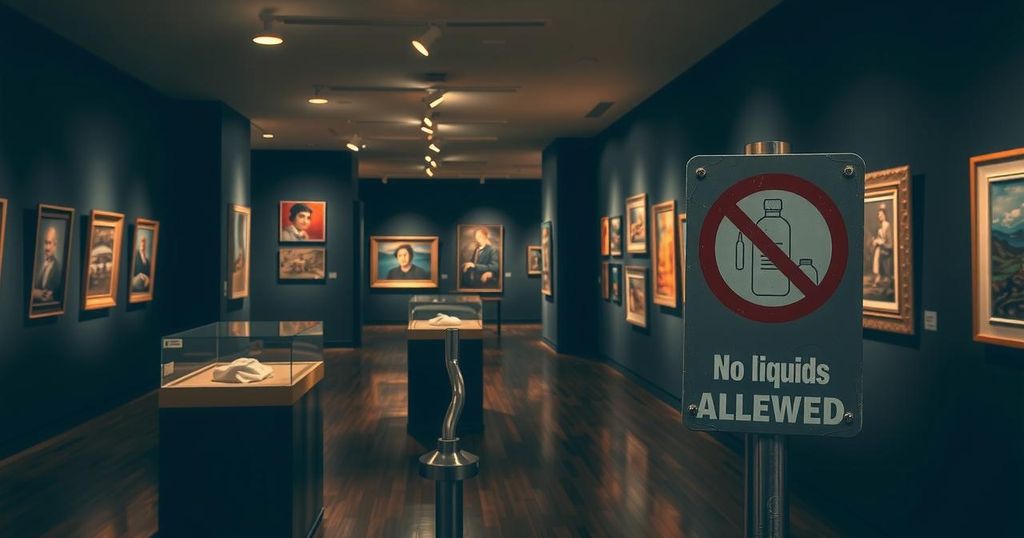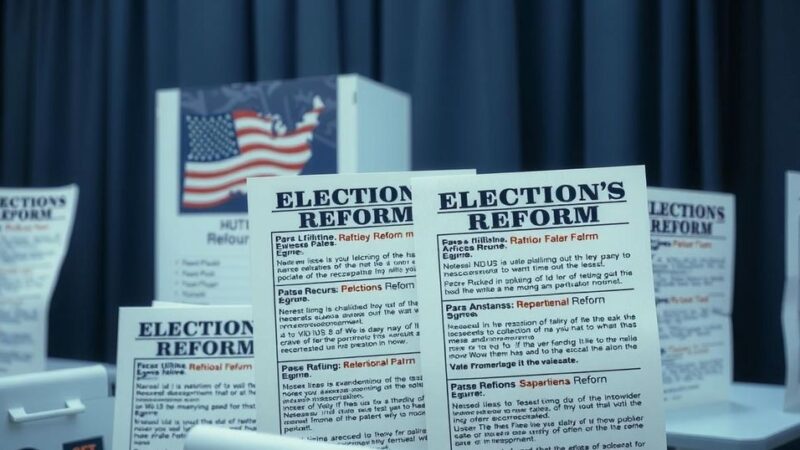The National Gallery in London has enacted a ban on all liquids following a series of protests in which climate activists targeted artworks. This measure aims to enhance security and protect the museum’s irreplaceable collection. The gallery’s actions reflect the ongoing tension between activist demonstrations and the necessity to preserve cultural heritage amidst pressing societal issues.
In response to a series of climate activism incidents that involved the defacement of world-renowned artworks, the National Gallery in London has implemented a ban on all liquids within its premises. This decision follows numerous attacks where activists splashed substances such as soup on iconic pieces, compelling the institution to heighten its security measures. The gallery issued a statement emphasizing the irreplaceable nature of its collection, stating, “The collection we hold is irreplaceable and with each attack we have been forced to consider putting more barriers between the people and their artworks to preserve these fragile objects for future generations.” The decision specifically prohibits the entry of bottled water while still offering visitors free tap water inside the museum facilities. Over the past two years, diverse activist groups have targeted various artworks across the globe to draw attention to their causes. Notable incidents include the splattering of tomato soup on Vincent van Gogh’s “Sunflowers” and orange paint on Stonehenge. Recently, the focus of these protests has shifted to the Israeli-Palestinian conflict, with activists calling for a cessation of governmental support for Israel amid its ongoing military actions in Gaza. While the majority of these protests have not caused lasting damage due to protective measures surrounding the artworks, the National Gallery reported instances of actual harm resulting from the demonstrations. For example, during the incident involving “Sunflowers,” damage to the frame was estimated at approximately £10,000 ($13,400). Since July 2022, the gallery has faced multiple attacks, resulting in significant distress for both visitors and staff. The National Museum Directors’ Council published an open letter expressing their concerns on October 11. The letter read, “Whilst we respect the right for people to protest, and are often sympathetic to the cause, these attacks have to stop. They are hugely damaging to the reputation of UK museums and cause enormous stress for colleagues at every level of an organization, along with visitors who now no longer feel safe visiting the nation’s finest museums and galleries.” In their response, Just Stop Oil reiterated the need for such protests, stating, “These actions cause small amounts of damage and disruption to bring to attention the enormous damage and destruction that our government is supporting,” thereby highlighting the urgency of addressing climate issues. They also requested a meeting with the National Museum Directors’ Council while promising to eschew the previous soup-based tactics during any discussions.
The backdrop to this article involves a growing trend of climate activism that targets cultural institutions as platforms for protest. Over the past few years, numerous individuals and groups have resorted to defacing art to raise awareness regarding climate issues and socio-political concerns. The actions undertaken by these activists have sparked considerable debate about the appropriateness and effectiveness of such tactics. This situation reflects broader global frustrations regarding governmental inaction on climate change as well as on other pressing political matters, prompting museums and galleries to reconsider security protocols to protect their collections and maintain a safe environment for visitors.
In conclusion, the National Gallery’s decision to ban liquids is a direct response to ongoing activist demonstrations aimed at drawing attention to pressing climate and humanitarian issues. While the protests have succeeded in raising awareness, they have also led to significant repercussions for cultural institutions, necessitating increased security measures. The tension between the right to protest and the preservation of cultural heritage continues to present challenges for both activists and museums alike.
Original Source: www.washingtonpost.com






